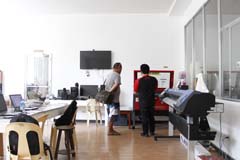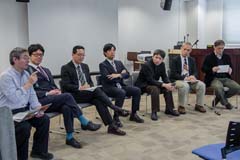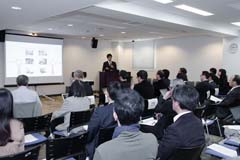Experts Discuss Development and Open Innovation
2016.03.04
In September 2015, the JICA Research Institute inaugurated the "Open Innovation and Development" research workshop to explore the relationship between the possibilities brought about by open innovation in developing countries and development assistance. Technology innovation, improved internet access and advances in popular fabrication, by making knowledge and expertise open, are said to be bringing dynamic changes to the framework of developed and developing countries, or in who assists and who is assisted.

JICA helped establish a fab lab in Bohol, Philippines
JICA-RI held a series of four meetings bringing together top-notch Japanese academics and experts in not just development economics and innovation, but also information and communications policy, to explore the possibility of "open innovation" in development, and drafted a study report. As an important milestone of the research project, an open seminar entitled "Open Innovation and Development" to discuss the draft report was held at the JICA Ichigaya Building on March 23, 2016.
At the seminar, the topic of Fab Labs was introduced and they were discussed as the main entry point to discussion of the study. Fab Labs are open digital workshops for citizens, with standardized fabrication equipment such as 3D printers and laser cutters that are used over the Internet, regardless of country or region. In Fab Labs, people carry out development and manufacturing activities while exchanging innovative ideas through the internet.
Associate Professor Hiroya Tanaka of Keio University's Faculty of Environmental Information, who founded the first Fab Labs in Japan, explained the current status of the global Fab Labs network, with some focus on developing countries. Associate Professor Tatsuo Tanaka, a member of Keio University's Economics Faculty, addressed the rationality of assisting with Fab Labs while analyzing its possible business models from an economics point of view. JICA Senior Advisor Tomoyuki Naito made suggestions from the perspectives of Fab Labs' suitability and indicated possible ways to consider assistance schemes within JICA's portfolio. The presentations were followed by a panel discussion including a Q&A with the participants on the floor.
Hiroya Tanaka talked about initiatives to effectively use Fab Labs in developing countries to respond to local needs. He showed examples of products to improve people's daily lives being manufactured in Fab Labs in India, such as devices for repelling stray dogs, solar cookers and human-powered generators, among other items. Moreover, giving the example of wireless antennas for Internet access in Afghanistan made by elementary school students, who used open-sourced designs, he talked about the possibilities of residents themselves solving problems in places where public services are inadequate. He said open innovation is the end of the "give and take" model and the beginning of the "join and share" model. Tatsuo Tanaka brought up two advantages Fab Labs have. One is their cost effectiveness in creating a manufacturing environment with very little skilled labor and capital equipment, and the other is the fact that they allow a community's unique demands to be discovered. On the other hand, he pointed out, because it is difficult for Fab Labs to earn a profit alone, and the human resources trained and educated at Fab Labs tend to drain out of them, paradoxically there is a great need for development assistance for Fab Labs as public goods.

Participants listen to a presenter
Naito, giving examples of efforts toward the use of open innovation development, talked about the Global Delivery Initiative, a platform for documenting examples of success and failure around the world related to development and sharing them openly, being promoted by the World Bank Group; the ecosystem being created from kLab (an abbreviation of knowledge lab), a cooperative project of the Rwandan government and JICA in which an incubation center is being built, along with a Fab Labs in the adjacent space; and UNICEF's Innovation Lab as another example of venue for innovation creation. Not just the establishment of a Fab Labs, but also a fundraising model to secure running costs, a regulatory framework, organizational development and skills and capacity building are necessary to sustain activities by Fab Labs, where there is a role that aid projects can play, he said.

Discussion among panelists
Professor Izumi Aizu of the Institute for InfoSocionomics, Tama University, served as moderator of a panel discussion. Participants included Professor Toshiya Jitsuzumi of Kyushu University's Faculty of Economics; Associate Professor Tomoaki Watanabe, of the Graduate School of Media and Governance, Keio University; Senior Researcher Yutaka Tokushima of the Keio Research Institute at SFC; and Koji Yamada, an advisor of the Planning Department, JICA.
Tokushima, who assisted with the opening of a Fab Lab in the Philippines when he was a Japan Overseas Cooperation Volunteer and continues to assist the lab, said open innovation - including Fab Labs - tends to produce more and scrap more, but the surviving achievements are changing society. He also brought up the issue of the evaluation criteria of ODA projects, which sometimes are not necessarily applicable to innovative projects such as Fab Labs.
Summarizing the discussion, Aizu said conventional development cooperation can be said to be relatively low-risk and low-return, and with high-risk, high-return innovation, it may be necessary to change the method of evaluation and the evaluation axis, and it may be advisable to keep in mind various new experiments other than Fab Labs.
Ichiro Tambo, then-Director of the JICA Research Institute, gave the closing address. He said that while the concept of mobile banking was not realized in developed countries because of regulatory problems, it has been implemented in Kenya and is spreading throughout Africa on a large scale. Using this example, he pointed out that innovation is not happening only in developed countries, but it also is taking place rapidly in developing countries. He concluded by saying that "join and share" - or "joint learning" and "solution providing" will be important to contribute to solving the world's development issues.
Interview: 'Digital revolution and open innovation' with Izumi Aizu, Tama University
"Interview: 'Fab Lab and social fabrication' with Hiroya Tanaka, Keio University"(JICA-RI Official Channel)

事業事前評価表(地球規模課題対応国際科学技術協力(SATREPS)).国際協力機構 地球環境部 . 防災第一チーム. 1.案件名.国 名: フィリピン共和国.

事業事前評価表(地球規模課題対応国際科学技術協力(SATREPS)).国際協力機構 地球環境部 . 防災第一チーム. 1.案件名.国 名: フィリピン共和国.

事業事前評価表(地球規模課題対応国際科学技術協力(SATREPS)).国際協力機構 地球環境部 . 防災第一チーム. 1.案件名.国 名: フィリピン共和国.

事業事前評価表(地球規模課題対応国際科学技術協力(SATREPS)).国際協力機構 地球環境部 . 防災第一チーム. 1.案件名.国 名: フィリピン共和国.

事業事前評価表(地球規模課題対応国際科学技術協力(SATREPS)).国際協力機構 地球環境部 . 防災第一チーム. 1.案件名.国 名: フィリピン共和国.